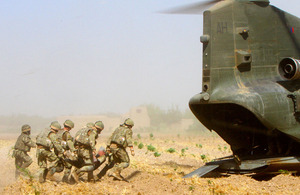4 SCOTS deliver blow to insurgency in Nahr-e Saraj
Soldiers from A Company, The Highlanders, 4th Battalion The Royal Regiment of Scotland (4 SCOTS), have struck a blow to the insurgency in the Nahr-e Saraj district of Helmand province.

Soldiers from A Company, 4 SCOTS, rush a wounded soldier to a Chinook helicopter in Nahr-e Saraj district, Helmand province [Picture: Lance Corporal Bryan Nygaard, ISAF 2011]
As dawn broke over Nahr-e Saraj district on 2 July 2011, several Chinook helicopters landed in a small pocket of farmland.
More than 60 soldiers from A Company, 4 SCOTS, then sprinted from the back of the helicopters and moved into defensive positions. However, there were no insurgents waiting to greet them with gunfire - just a few farmers herding their goats and camels.
The pocket of farmland represented a key intersection for insurgent narcotics facilitation routes. It was also known as a location from which insurgents managed money, logistics and intelligence. This safe haven had never seen coalition or Afghan security forces.
A Company’s mission was to disrupt insurgent activity in the area and to spread the message to locals that the Government of the Islamic Republic of Afghanistan planned to take over responsibility for the area.
The company aimed to do this by taking over a compound and by holding a shura with local elders, but things did not go exactly as planned.
Within minutes of moving into one of the first compounds, A Company had insurgent mortar shells falling within 100 metres of them.
A sniper in Reconnaissance Platoon, A Company, 4 SCOTS, who for security reasons is referred to as ‘Jim’, was one of the first to return fire:
We started getting [indirect fire] on the high ground, so we decided to back off,” Jim said. “As we were moving through the dead ground, we saw some fighting-age males on the roof of a compound. So I stopped, got my optics out, and had a look.
A guy turned around and he had a long-barrelled weapon. I took up a firing position.
He was about 1,200 metres away and I took him down with the first round. I continued to scan the area to see if there were any more [insurgents]. I think after they saw the one guy get hit they kind of ducked out and they weren’t having any of it.
What followed were hours of manoeuvring and firing between the soldiers of A Company and insurgents.
While wearing 45 pounds (20kg) of body armour and carrying ammunition and packs filled with seven litres of water per man, the soldiers moved from compound to compound while enduring temperatures of up to 54 degrees Celsius:
We would move and they would try to hit us again,” said Jim. “They were doing quite well today, using a number of different firing points. Firing from inside of the compounds while other insurgents would fire from the outside of them.
Intercepted radio transmissions revealed there were more than 60 Taliban fighters in the area:
It was definitely a hornets’ nest,” said Captain Ben James, Commander of A Company’s Reconnaissance Platoon. “It felt as if they were defending something. They were in an area that they didn’t want to give up.
They were firing and shooting while [air support] was up in the air, which isn’t normal.
During the day-long, sporadic fighting, A Company suffered one wounded soldier, while intercepted radio transmissions revealed the insurgents lost at least 14 fighters:
It was massively positive in that we landed right in the middle of their heartland and disrupted their chain of command,” said Captain James.
We struck a command and control node. We sowed the seeds of doubt in their mind as to where we were going to come from next. It was a success because we moved in, held our ground, had a bit of a scrap, and moved out covertly without them knowing that we had left.
Later that evening, the entire force moved south out of the area under the cover of darkness. The soldiers marched more than four miles (6km) through irrigated fields, rows of corn, dense underbrush and ditches that were knee-high with water.
At the end of the gruelling hike was an outpost where food and water awaited them. After a few hours of rest, the soldiers then boarded helicopters and were transported back to Camp Bastion, where they had departed for the operation just 24 hours earlier, mission completed.